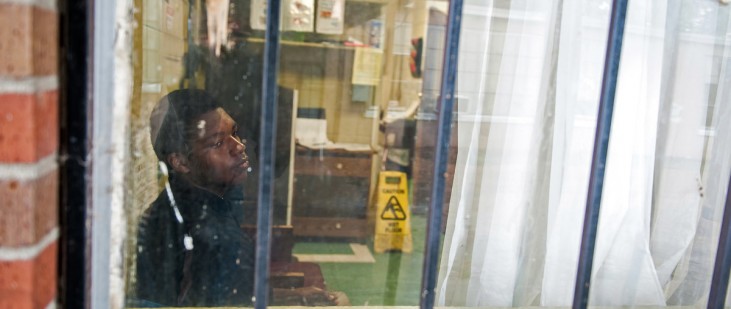The Marshall Project’s Eli Hager reports on the growing use of “alternative schools” — isolated classrooms, where students are often met with corporal punishment and humiliating treatment — as a way to lower suspension rates among rural schools in the South.
By Eli Hager | The Marshall Project | November 11, 2015
Rockmon Montrell “Rock” Allen, an 18-year-old from Jackson, Mississippi, has never gone to jail. But school, he says, was close enough. At Ridgeland High School, a large public school in an increasingly black suburb of Jackson, he was punished repeatedly for what seemed like minor reasons.
In the ninth grade, when he wore the wrong-color uniform or didn’t tuck in his shirt, Rock got “whooped,” as he puts it. That meant bending over, putting his hands on a desk, and getting hit three to five times on the backside with a flat wooden paddle. Mississippi is one of only four states—the others are Alabama, Georgia, and Texas—where school districts frequently use corporal punishment on students (although 19 states allow the practice by law). Teachers and administrators openly use paddles—and, in rarer cases, belts, rulers, and key chains—to whip kids into order.
In the 10th and 11th grades, according to Rock’s official disciplinary record, he was sent to in-school detention whenever he spoke out of turn, questioned a teacher, was tardy, or refused to take off his hat. In-school detention, which in some schools is referred to as in-school suspension, takes place during school hours. Instead of being in class, Rock would sit in an empty room, doing nothing, for up to three days at a time.
“I wouldn’t say I was a smart aleck,” he says, “but I was known for speaking up.” He recalls asking “why” a lot, like why the pilot of the Enola Gay wasn’t considered “the worst murderer of all time,” and praising Karl Marx during history class. By Rock’s own description, he is curious by nature; he’s always thinking, always speaking up. “Teachers either loved me or hated me,” he says.
Then, in 2014, a few weeks into the 12th grade, Rock did the same thing a 16-year-old black girl in Columbia, South Carolina, did this October: He pulled out his cellphone during class.
When his principal told him to put it away, according to the school, Rock responded with a verbal threat: “I’m going to bust [the teacher] for taking everybody’s phones,” he said. For that outburst, he was sent to Madison County Academic Option Center, an “alternative school” 15 miles away. He was required to stay there for four months.
In most states, students with emotional or learning disabilities or who are low on credits and at risk of dropping out are enrolled in alternative schools for long stretches, usually a year or more. But in Mississippi, students are temporarily placed there as punishment.
At Rock’s alternative school, there were no windows in the classrooms and hallways. Teams of up to seven police officers regularly walked in and out, searching students’ jackets. Rock grew to like the sometimes-overwhelmed teachers, but, he says, ninth- and 12th-graders were all held together in the same crowded rooms and received no academic instruction for weeks at a time.
By December, Rock was released and tentatively put on probation. He returned to his regular high school, where any infraction would mean getting sent back to the alternative school.
Only a few days later, Rock was caught in the parking lot during lunch—a common practice that isn’t against school rules—and charged with being “outside of his assigned area” in violation of his probation.
He was sent back to the alternative school for the remainder of his senior year.



